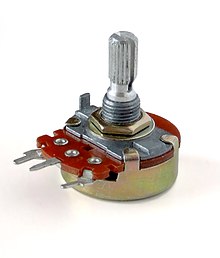Potentiometer

Potentiometers are variable resistors. Potentiometers are resistors where the resistance can be changed using a knob or a slider. Potentiometers are used to control many things, including how bright or dim the lights in your house are and the volume controls on your television.[1] Some are used in voltage dividers.
The idea of a device that could be used to control the amount of electricity going to a component was thought by many people, but the carbon potentiometer we commonly use today was invented by Thomas Edison in 1872 at the age of 25. He called this device a "coiled resistance wire rheostat". His patent for this device was issued in 1872. Carbon resistors, as said above, are the most commonly used resistors today. They are used in radios to control the volume, in televisions to control picture brightness, contrast, and color response.[2][3][4]
Different types[change | change source]
There are many different types of potentiometers. These different types include carbon potentiometers, plastic potentiometers, and wire potentiometers. Carbon potentiometers are the most common potentiometers that we use today because they are inexpensive to make and are easy to put together. Wire potentiometers are the most powerful type out of the three listed above. The wire inside the potentiometer is wound so that it has more power. Plastic potentiometers have the same amount of power that carbon potentiometers do, but are of a higher quality. They are made of a special kind of plastic that conducts electricity just as effectively as carbon potentiometers. It as a better life than carbon potentiometers do.[5] Trimmer potentiometers are small. They are adjustable with a screwdriver.
References[change | change source]
- ↑ "Potentiometer tutorial". Archived from the original on 20 September 2012. Retrieved 20 May 2012.
- ↑ "Potentiometers". Archived from the original on 4 February 2013. Retrieved 20 May 2012.
- ↑ "Potentiometer". Archived from the original on 3 July 2012. Retrieved 20 May 2012.
- ↑ Ron Kurtus (22 January 2012). "Thomas Edison: Birth to Age 40". Retrieved 20 May 2012.
- ↑ Haresh Khemani (29 August 2009). "Types of Potentiometers". Bright Hub Inc. Archived from the original on 14 May 2012. Retrieved 20 May 2012.
